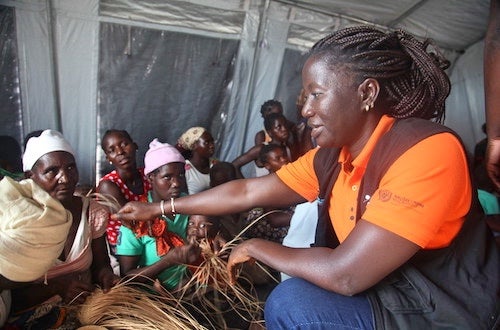News
Training new midwives in storm-hit Mozambique
- 29 May 2019
News
BEIRA, Mozambique – When Sabine Nana was a little girl, she spent much of her time waiting for her mother to come home from the local health facility.
Ms. Nana's mother worked very hard, as she was the only specialist delivering babies for a large village. But when she returned each night, her daughter recalls, she would always be happy if the mother and baby were both healthy.
That feeling of accomplishment in assisting safe birth inspired Ms. Nana to follow in her mother's footsteps and become a midwife. That was just the beginning – she soon discovered that being a midwife is much more than delivering babies.
"After every single delivery, I am so happy to make the announcement to the family, and enjoy how they celebrate," Ms. Nana explains. "Helping a mother giving birth and stay alive is a great mission for me."
She also became interested in family planning, which many in her village did not have access to.
"I wanted to work as a midwife to help improve family planning use... [it was] a way to help young girls escape unwanted pregnancy and continue their studies,” she said.

Gratifying experience
Ms. Nana is from Burkina Faso but is now based in Beira, Mozambique. She is part of UNFPA's response team for Cyclone Idai, which over a month ago devastated entire areas of the country and caused over 600 deaths.
Ms. Nana trains newly recruited local midwives in life-saving skills for labour and delivery. She also helps set up temporary maternity and sexual and reproductive health units at the worst- affected health facilities.
Working in an emergency setting, Ms. Nana says, is even more gratifying than her regular job: "I know I am useful for society, and this keeps me more engaged and inspired as a midwife.”
A veteran of multiple humanitarian crises, Ms. Nana began her career with the Ministry of Health in Burkina Faso. She then went on to serve with Médecins Sans Frontières in the Rohingya refugee camps in Bangladesh, as well as in the Democratic Republic of Congo, Haiti and Mauritania.
Despite her field experience, Ms. Nana was still shocked at the desperation the cyclone left behind in Mozambique.
“I arrived a few weeks after Idai struck. The earth had begun to dry but the people’s tears continued to fall," she says. "People had lost their loved ones, their property and their memories. Women, children and adolescents live in a precarious situation of lack of access to quality health services."

Motivated by team work
In Mozambique, Ms. Nana takes advantage of her skills in sexual and reproductive, maternal and newborn health, as well as her expertise in dealing with gender-based violence, to help the UNFPA team train local hires on clinical management of rape. This is critical in humanitarian crises, during which gender-based violence often increases as protection mechanisms are disrupted and displaced people live in group shelters.
Ms. Nana is committed to doing her part to help UNFPA's post-disaster response prevent unwanted pregnancies, provide women access to health centres and skilled birth attendants, and give medical treatment and psychosocial support to survivors of gender-based violence.
Her morning routine starts with field visits to Bandua and Buzi districts, 400 km away from her base in Beira. Ms. Nana leaves early in the morning with a dedicated team to erect tents and accommodations for midwives who lost their homes but keep working in roofless health centres, where floods swept away all the medical equipment and drugs.
The UNFPA team is working hard to install and equip tents to be used as temporary maternity clinics, stock medicines and reproductive health kits, and deploy trained and skilled midwives.
According to Ms. Nana, a typical day feels like a training simulation for humanitarian work in an emergency. But it's not a drill – the emergency is real. Thank goodness, she points out, that team members are well prepared and ready to adapt to any situation on the ground.
“My daily motivation is based on the team's work,” says Sabine. “I have support from others, and I give what I have to help others. The work is still a lot, and there is still a long way to go, but we will succeed together.”